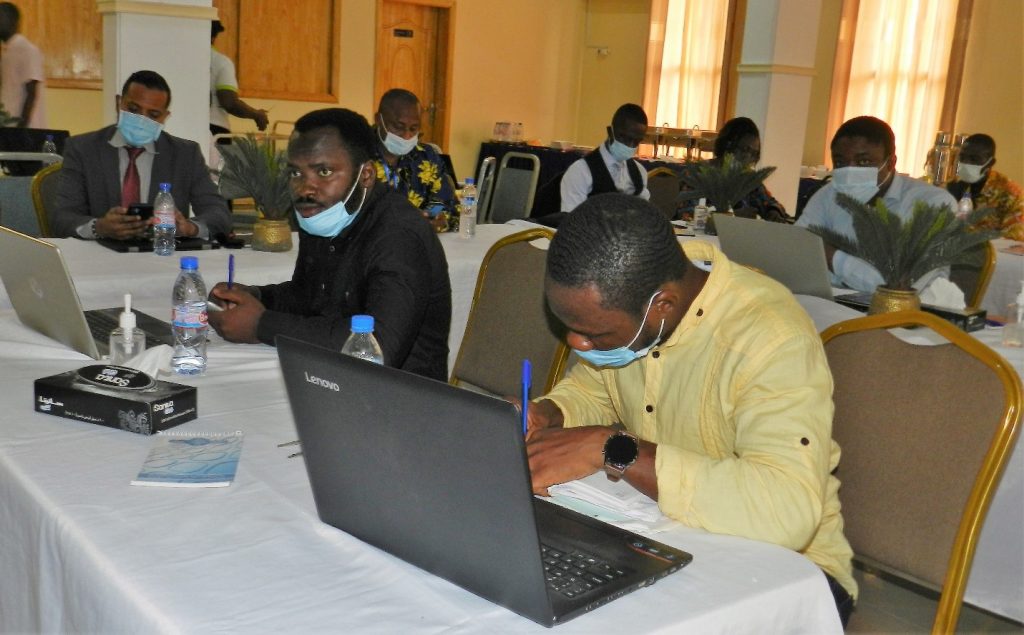The Environmental Protection Agency of Liberia (EPA) and the United Nations Development Program (UNDP) on Thursday, 9th December 2021 held a one-day inception workshop for the Monrovia Metropolitan Climate Resilience Project (MMCRP).
MMCRP seeks to address one of Monrovia’s most urgent adaptation needs by constructing a rock revetment to protect West Point against coastal erosion and storms.
The inception meeting was intended to inform stakeholders and partners about the commencement of the project and activities to be undertaken, deliverable and outcomes to be met and progress made thus far, Zienu Kanneh, MMCRP Coordinator said.
Kanneh disclosed that it was also intended to highlight the roles and responsibilities of the project management unit and implementing institutions.
In May 2021, the Green Climate Fund (GCF) approved US$17.2 million in grant funding for the construction of a coastal defense wall to protect the Monrovia Metropolitan area from coastal erosion and storms.
The Government of Liberia is providing US$6.8 million in co-financing while UNDP Country Office is also providing $US1.5 million to buttress the GCF funding for the MMCRP.
The project is expected to benefit approximately 250,000 vulnerable people living in the Monrovia Metropolitan Area.
The MMCRP also aims to address barriers to effective climate change adaptation in the coastal zone of Monrovia, and its environs including other parts of the country, with a focus on three inter-related interventions including coastal protection; coastal management; and diversified climate-resilient.
The project comes amidst increased vulnerability of the coastal zones of Liberia to the climate change impacts of sea-level rise (SLR) and the increasing frequency of high-intensity storms, both of which contribute to coastal erosion and shoreline retreat.

Prof. Wilson K. Tarpeh, CEO and Executive Director of EPA Speaking at the workshop
Speaking at the inception workshop, EPA Executive Director and Chief Executive Officer (CEO), Prof. Wilson K Tarpeh said it had been barely six years since the EPA embarked on the development of a project concept idea about saving the township of West Point due to coastal erosion.
He furthered that the idea came about after the completion of Liberia’s National Adaption Plan (NAP) program actions in 2006, which identified West Point as one of the highly vulnerable shorelines in Monrovia in relations to climate change.
“The shoreline of West Point was identified as one of the vulnerable land areas within Monrovia that needs urgent and adaptable action to avoid the washing away of the area, which will amount to the loss of lives, destruction of dwelling homes, destruction of strategic infrastructures for example the Liberia Electricity Corporation (LEC) that houses electrical transmission and distribution equipment that serves the Township of West Point and other parts of Monrovia,” the EPA boss noted.
After several back and forth negotiations with the Green Climate Fund, Prof. Tarpeh revealed that the Board of Fund approved a grant, something he said was made possible through the support of President George Manneh Weah, Ministries of Finance, Public Works, Mines and Energy and the UNDP, West Point dwellers amongst others.
Dorsla Farcarthy, UNDP Team Leader lauded theGovernment of Liberia, under the administration of President George M. Weah, for Liberia’s successful and meaningful participation in the just ended COP 26 in Glasgow, which according to him further demonstrates Liberia’s commitment to the Paris agreement and global effort to address climate change.
Mr. Farcarthy stressed the need for following up and taking concrete actions on the outcomes of the COP 26 especially the issues around sustainable forest management (SFM).
Speaking further, he said the essence of the inception workshop was to informed stakeholders and partners about the commencement of the project and activities to be undertaken, deliverables and outcomes to be met, and progress made thus far.
He disclosed that the 6-year project is so far the largest coastal resilient project funded in Liberia through the GCF.
“This is an opportunity to draw upon the lessons learnt and build upon the success from implementation of other GCF and GEF funded projects and demonstrate the commitment and capacity of Liberia to successfully manage major donor projects that contributes toward climate action,” Mr. Farcarthy said.
According to him, the project, which will be significantly implemented in West Point, an impoverished and densely populated informal settlement, is very important for the community considering the impacts of sea erosion on the population over the last 10 years.
“Hence, we encourage a strong partnership with the community, development partners and the Government of Liberia and seek to enlist their full cooperation and support from this inception to full implementation of the project,” he added.
According to Mr. Farcarthy, there is a need to collectively work together to change the current approach to addressing the impacts of climate change from a focus on short-term solutions to long-term integrated and participatory planning that involves the public sector, private sector and communities at all levels of governance.
“Therefore this project is taking an integrated coastal zone management approach in its implementation,” he noted.
Mr. Farcarthy further stated that consistent with the approved project document and the Funding Activity Agreement, this project has three funding sources, with the highest amount, $17 million of grant coming from the Green Climate Fund. The remaining $8 million is supposed to come from the Government of Liberia and the UNDP.
“While the disbursement of the first GCF grant of $523,932.00 has been fulfilled, the subsequent disbursements will depend on the commitments of the Government of Liberia and the UNDP to contribute their co-financing obligations,” he Farcarthy disclosed
He disclosed that UNDP stands ready to support Liberia in the implementation of the project, consistent with the Project Document and Funding Activity Agreement with the GCF.
“To achieve the results of the project, UNDP will continue to strengthen its partnerships with Ministry of Finance & Development Planning, Ministry of Mines & Energy and Environmental Protection Agency and other government entities, beneficiary communities, civil society organizations (CSOs), Community Based organization and the Private Sector,” he indicated.
“Ladies and gentlemen, as we convene today for the inception of this very important project, I want to express my gratitude for the opportunity to work with you all in this process and look forward to a rewarding and successful impact of the project,”
Mr. Farcarthy told participants drawn from line ministries, agencies and commissions of the Liberian Government.
For his part, the senior environmental specialist of the World Bank in Liberia Shafick
Hoossein said coastal erosion is an issue that is faced worldwide and most importantly affects very venerable communities.
He said as a partner of development to Liberia, his institution is also committed to assisting in climate change endeavors, saying the workshop was an important start of the greater scale of action in ensuring that vulnerable communities are saved.
Montserrado County Electoral District # 7 Representative Solomon George lauded the Government of Liberia for initiating the project, which according to him will bring relief to his people.
West Point is situated in Electoral District # 7.
Representative George also thanked UNDP and GCF for funding the project.
Also speaking, William Weh, Commissioner of the Township of West Point thanked the Government of Liberia through the EPA for the project and pleaded for its immediate and speedy implementation to avoid more homes from being wash away by the ocean.
Commissioner Weh’s concern was immediately addressed by John C. L. Mayson, Technical Advisor on the MMRCP, who said that the project has already started and that local residents should expect seeing people in their communities.

Cross-section of participants at the workshop






